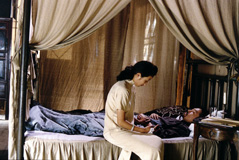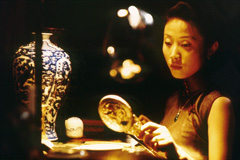|
Newest Reviews:
New Movies -
The Tunnel
V/H/S
The Tall Man
Mama Africa
Detention
Brake
Ted
Tomboy
Brownian Movement
Last Ride
[Rec]ł: Genesis
Hara-Kiri: Death of a Samurai
Indie Game: The Movie
Abraham Lincoln: Vampire Hunter
Old Movies -
Touki Bouki: The Journey of the Hyena
Drums Along the Mohawk
The Chase
The Heiress
Show
People
The Strange Affair of Uncle Harry
Pitfall
Driftwood
Miracle Mile
The Great Flamarion
Dark Habits
Archives -
Recap: 2000,
2001, 2002,
2003, 2004
, 2005, 2006,
2007 , 2008
, 2009 ,
2010 , 2011 ,
2012
All reviews alphabetically
All reviews by star rating
All reviews by release year
Masterpieces
Screening Log
Links
FAQ
E-mail me
HOME
| |
Springtime in a Small Town (Tian Zhuangzhuang) 2002
 An elegant shout-out to old school China and Chinese
filmmaking, Tian Zhuangzhuang’s Springtime in a Small Town is
completely unembarrassed by its straightforwardness, and that’s a bigger
achievement than it might sound in this day and age. It is apparently the remake
of a classic 1948 Chinese film by Fei Mu (which I haven’t seen), but unlike
most reworkings of classic films, it feels no need to comment upon the datedness
of the melodrama that unfolds. Instead, it uses the classic structure of the
original to illustrate how timeless its concerns were, and make the gap between
then and now seem narrower. As a bonus, because today’s audiences watch it
with different dramatic expectations than audiences in 1948 did, it has a sense
of nostalgia and loss that only enhances the feelings of wistfulness that
already exist in the script.
An elegant shout-out to old school China and Chinese
filmmaking, Tian Zhuangzhuang’s Springtime in a Small Town is
completely unembarrassed by its straightforwardness, and that’s a bigger
achievement than it might sound in this day and age. It is apparently the remake
of a classic 1948 Chinese film by Fei Mu (which I haven’t seen), but unlike
most reworkings of classic films, it feels no need to comment upon the datedness
of the melodrama that unfolds. Instead, it uses the classic structure of the
original to illustrate how timeless its concerns were, and make the gap between
then and now seem narrower. As a bonus, because today’s audiences watch it
with different dramatic expectations than audiences in 1948 did, it has a sense
of nostalgia and loss that only enhances the feelings of wistfulness that
already exist in the script.
 The interactions between the characters in Springtime
obviously form a political allegory, but rarely have I seen allegorical conceits
that were as likeable as these characters are. With a cast that really only has
five roles, the movie flirts with being a chamber drama, but with intense
attention to environment and a great eye for natural detail that disqualifies it
from that genre. Starting in the spring following the chaos of World War II, the
film opens with the question of whether a fresh start or a recreation of things
lost should arise from the rubble. A love triangle arises, and through that the
movie quite plainly asks whether our attentions should be focused on preserving
the ailing past or abandoning it to start anew. Zhuangzhuang’s exquisite
direction ensures that although the plot might stay simple, it remains visually
and psychologically captivating. One scene, shot in a long take, in which he has
two prospective lovers shift around two electric lamps – one lit, one not (a
metaphor that extends throughout the film) – to illustrate the ebb and flow of
their feelings toward one another, is about as complexly choreographed a scene
– both emotionally and physically - as you’re likely to find in a film this
year (unless you count the just as impressive games of paper-rock-scissors that
are played later on). Just as you think the sequence has as much weight as it
can bear, however, he has Yuwen, the woman, leave the room momentarily, only to
overhear the cough of her sleeping husband while she’s passing by his chamber,
suddenly putting her mind back on the reality of her situation. Touching scenes
like that one are the rule in Springtime, and they feel much more
poignant for not having to strive for effect. In his film, Zhuangzhuang creates
delicate balance of style, text, and subtext that’s so simple and precise that
anything discordant would topple the balance, but against all odds, nothing
does.
The interactions between the characters in Springtime
obviously form a political allegory, but rarely have I seen allegorical conceits
that were as likeable as these characters are. With a cast that really only has
five roles, the movie flirts with being a chamber drama, but with intense
attention to environment and a great eye for natural detail that disqualifies it
from that genre. Starting in the spring following the chaos of World War II, the
film opens with the question of whether a fresh start or a recreation of things
lost should arise from the rubble. A love triangle arises, and through that the
movie quite plainly asks whether our attentions should be focused on preserving
the ailing past or abandoning it to start anew. Zhuangzhuang’s exquisite
direction ensures that although the plot might stay simple, it remains visually
and psychologically captivating. One scene, shot in a long take, in which he has
two prospective lovers shift around two electric lamps – one lit, one not (a
metaphor that extends throughout the film) – to illustrate the ebb and flow of
their feelings toward one another, is about as complexly choreographed a scene
– both emotionally and physically - as you’re likely to find in a film this
year (unless you count the just as impressive games of paper-rock-scissors that
are played later on). Just as you think the sequence has as much weight as it
can bear, however, he has Yuwen, the woman, leave the room momentarily, only to
overhear the cough of her sleeping husband while she’s passing by his chamber,
suddenly putting her mind back on the reality of her situation. Touching scenes
like that one are the rule in Springtime, and they feel much more
poignant for not having to strive for effect. In his film, Zhuangzhuang creates
delicate balance of style, text, and subtext that’s so simple and precise that
anything discordant would topple the balance, but against all odds, nothing
does.
* * * *
10-06-02
Jeremy Heilman
|